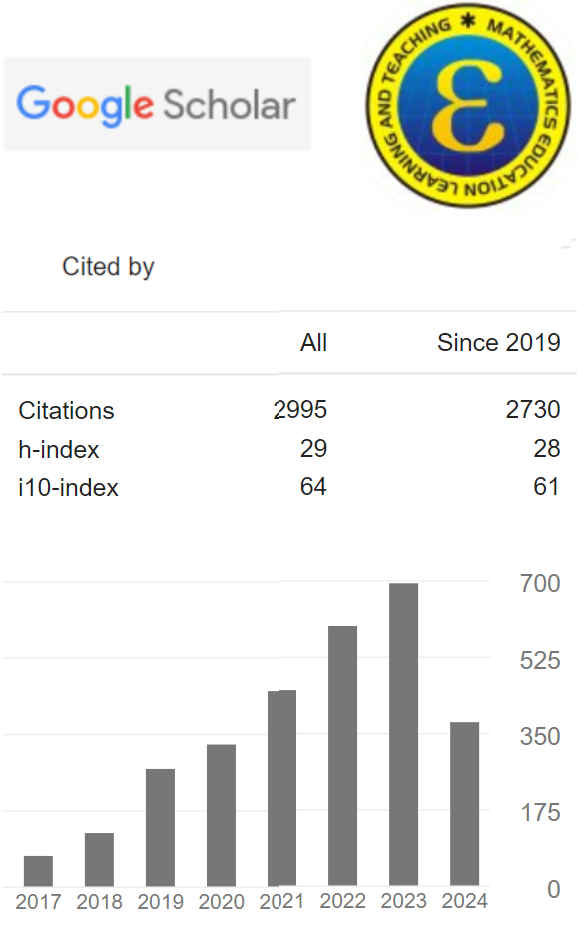Exploring Secondary Students' Algebraic Thinking in Terms of Intuitive Cognitive Style
(1) Universitas Muhammadiyah Surakarta
(2) Universitas Muhammadiyah Surakarta
(*) Corresponding Author
Abstract
Algebraic thinking has the important role to improve the students' understanding in solving real-world problems, especially in algebraic forms. The aim of this study is to explore the students' algebraic thinking in terms of intuitive cognitive style. This research used the qualitative approach with case study method. 61 Grade-8 students in one of public secondary schools in Ngawi District, East Java, Indonesia were participated in this study. Three intuitive subjects were selected for interviewed. This study used algebraic thinking test, questionnaires, and interview protocol for collecting the data. Researchers adopted ten questions from TIMSS 2011 8th-Grade to examine the students algebraic thinking abilities. All questions were validated by three experts in mathematics education and piloted before used. In this study, three algebraic thinking components: generalization, analytic thinking, and dynamic thinking were used to analyze the students algebraic thinking abilities. Â The finding showed that the intuitive students can solve number pattern problems using picture and number patterns in generalization component. In analytic thinking component, students can solve problems related to equations using trial-error strategies and substitution methods. The students can also carry out dynamic thinking component about equivalent proportion by determining the median value and proportion concept. Thus, it can be concluded that the intuitive students are able to demonstrate the three algebraic thinking components properly
Keywords
Full Text:
PDFReferences
Agoestanto, A., Sukestiyarno, Y. L., Isnarto, Rochmad, & Lestari, M. D. (2019). The position and causes of students errors in algebraic thinking based on cognitive style. International Journal of Instruction, 12(1), 1431–1444. https://doi.org/10.29333/iji.2019.12191a
Van Amerom, B. A. (2002). Reinvention of early algebra: Developmental research on the transition from arithmetic to algebra (Doctoral dissertation). Utrecht University.
Arina, F. F., & Lukito, A. (2019). Algebraic Thinking of Junior High School Students In Solving Number Pattern Problems Based On Systematic And Intuitive Cognitive Style. Jurnal Ilmiah Pendidikan Matematika Volume, 8(1), 71–77. https://doi.org/10.26740/mathedunesa.v8n1.p71-77
Utami, R. E., Ekawati, C., & Handayanto, A. (2020). Profil Kemampuan Berpikir Aljabar Dalam Memecahkan Masalah Matematika Ditinjau Dari Gaya Kognitif Reflektif Siswa Smp. Jurnal Ilmiah Pendidikan Matematika, 5(1), 13-24. https://doi.org/10.26877/jipmat.v5i1.5502
Farida, I., & Hakim, D. L. (2021). Kemampuan Berpikir Aljabar Siswa Smp Pada Materi Sistem Persamaan Linear Dua Variabel (Spldv). JPMI (Jurnal Pembelajaran Matematika Inovatif), 4(5), 1123-1136. https://doi.org/10.22460/jpmi.v4i5.1123-1136
Jena, P. (2014). Cognitive Styles and Program Solving Ability of Under Graduate Students. International Journal of Education Adn Psychological Research (IJEPR), 71–76.
Kaput, J. J., Carraher, D. W., & Blanton, M. L. (Eds.). (2017). Algebra in the early grades. Routledge.
Kieran, C. (1998). The changing face of school algebra. In 8th International Congress on Mathematical Education: selected lectures: Sevilla 14-21 july 1996 (pp. 271-290). Sociedad Andaluza de Educación Matemática" Thales".
Kriegler, S. (2007). Just What is Algebraic Thinking? In Introduction to algebra :TeacherHandbook (pp. 1–11).
Kristanto, H. Y. W., & Manoy, J. T. (2021). Representasi Matematis Siswa SMA dalam Menyelesaikan Masalah Matematika Ditinjau dari Gaya Kognitif Sistematis dan Intuitif. Jurnal Penelitian Pendidikan Matematika Dan Sains, 4(2), 50. https://doi.org/10.26740/jppms.v4n2.p50-59
Kusumaningsih, W., Setiawan, P. Y., & Utami, R. E. (2020). Profil Berpikir Aljabar Siswa Smp Dalam Pemecahan Masalah Matematis Ditinjau Dari Gaya Kognitif Dan Gender. JIPMat, 5(1). https://doi.org/10.26877/jipmat.v5i1.5574
Lew, H. C. (2004). Developing algebraic thinking in early grades: Case study of Korean elementary school mathematics. The Mathematics Educator, 8(1), 88-106.
Maharani, P., Trapsilasiwi, D., Yudianto, E., Sunardi, & Sugiarti, T. (2018). Profil Berpikir Aljabar Siswa SMP Dalam Menyelesaikan Masalah Matematika Ditinjau Gaya Kognitif (Reflektif dan Impulsif). SAINTIFIKA (Jurnal Ilmu Pendidikan MIPA Dan MIPA), 20(1), 1–10. http://saintifika.or.id/index.php/saintifika/article/view/46
Martin, L. P. (1998). The Cognitive-Style Inventory. The Pfeiffer Library, 8(1), 1–18. http://home.snu.edu/~jsmith/library/body/v08.pdf
Miftaqurohmah, R., & Hayuhantika, D. (2020). Profil berpikir kreatif dalam penyelesaian masalah matematika melalui model eliciting activity ditinjau gaya kognitif. JP2M (Jurnal Pendidikan dan Pembelajaran Matematika), 6(1), 1-9. https://doi.org/10.29100/jp2m.v6i1.1738
Permatasari, D., & Harta, I. (2018). The Gap between the Beginning and the End of Algebraic Thinking Transition Period. International Journal on Emerging Mathematics Education, 2(1), 79–88. https://doi.org/10.12928/ijeme.v2i1.8655
Syuhriyah, K., Sa’dijah, C., & Subanji, S. (2021). Proses Berpikir Siswa Perempuan Bergaya Kognitif Intuitif Dalam Menyelesaikan Masalah Matematika. Jurnal Pendidikan: Teori, Penelitian, Dan Pengembangan, 6(4), 593. https://doi.org/10.17977/jptpp.v6i4.14721
TIMSS, & PIRLS. (2013). Released mathematics items TIMSS 2011 8th-Grade Mathematics Concepts and Mathematics Item. International Association for the Evaluation of Educational Achievement (IEA), 1–124.
Wettergren, S. (2022). Identifying and promoting young students’ early algebraic thinking. LUMAT: International Journal on Math, 10(2), 190–214. https://doi.org/10.31129/LUMAT.10.2.1617
DOI: 10.24235/eduma.v12i2.13568
Article Metrics
Abstract view : 55 timesPDF - 9 times
Refbacks
- There are currently no refbacks.
Copyright (c) 2023


.png)










